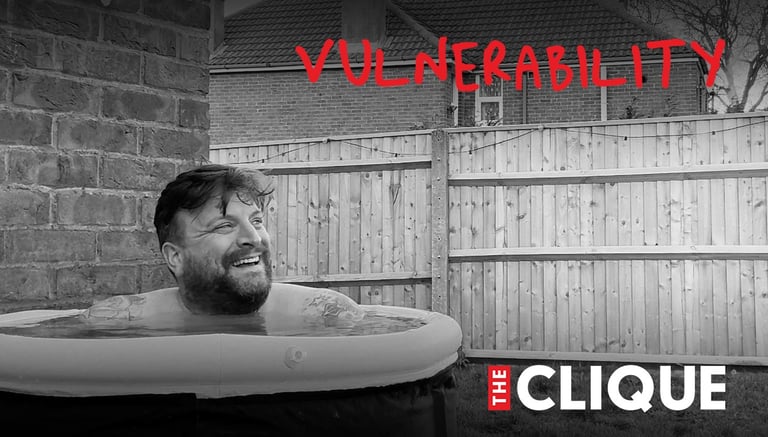Time to be vulnerable?


// It’s hard.
Being online, showing up as yourself and sharing your stories is the way that people tell you that you’ll bring people to you and yes, it’s true. People who share the intimacies of their lives ‘feel’ like real people because they don’t portray that faux corporate image which seems to have become the way that we show up.
But sharing in that way is daunting - what will the reaction be? What if people don’t resonate with it? What if it turns away potential sales? These are all valid and quite natural thoughts but I promise you - when you drop the need to portray a specific image, you will experience something you’ve probably never experienced.
But that’s where the hard work comes in.
// Where does that faux persona come from?
Social media is where people share their successes, their triumphs and they showcase what growth they’ve experienced year on year - it’s a rolling slideshow of successful people sharing their own personal highlight reels and the relentless sharing brings on the inner need to keep up - business is all about showing off capabilities and selling yourself and when you sell (especially those who are inexperienced in selling) - the belief is that you need to show that you’re infallible because who want’s to buy from someone or a company which makes mistakes or isn’t perfect.
The perfectionists in us all never want to show that we’ve failed because it’s not glamorous so we then fit into this weird middle ground where nothing is interesting and that’s what makes the majority drop out of posting.
Reposting content and sharing company updates fill the void and all we ever see is corporate mumbo jumbo which is why when someone shares something that’s not ‘social’ media related, it captures the imagination.
// There is a better way.
I’m not about to tell you to share your failures when they are happening because no-one does that - everyone is dealing with their own problems as they happen and posting about them on social media shouldn’t be another stress for you to consider but think of a time when you have failed and what you’ve learned about it - someone can learn from that.
For example, I once took an order from a ‘large’ corporation in the UK for some centrifugal pumps - I’d researched the pumps they wanted and located a price, got that quote and then quoted it to said ‘large’ corporation - only to be sent the Purchase Order.
I go to place the order on the pump manufacturer and all sorts of alarm bells go off on a credit search for this pump manufacturer, literally just before pressing the button on a £28k bank transfer.
That was a huge failure on my part - the chances of getting a large equipment order and boosting our revenue took over from common sense.
The enquiry from the ‘large’ corporation wasn’t real and the pumps never existed - they could only be bought from this one manufacturer and that’s where the scam originated.
I shared this story after it happened on social media (just before COVID) and it was once one of my best performing social posts.
It wasn’t a successful bragging story.
It wasn’t a win.
It was human and it showed we’re not perfect.
It helped people - people who were close to making the same mistake on the same scam. It became a way for me to connect with people because I shared my failure and people respected the honesty and vulnerability in sharing our situation.
// Vulnerability and Humility.
My management style and the way I interact with people is the same on social media as it is in person - I am happy to share my vulnerable side and share what I’m worried about/what I don’t know.
I have come to a place in my life where trying to ‘be’ someone isn’t my main priority and I don't gain anything by being someone else.
I’ve been in enough tough situations in my life to be comfortable sharing my mistakes and faults and that’s where we’re able to show humility and vulnerability.
This allows us to be open to teachable moments, giving us the self-awareness to recognize flaws in ourselves and others while strengthening bonds.
Social media should be a reflection of real life, it’s how people build bonds and it’s how you can build bonds too.
The key is vulnerability is humility.
When people embrace humility, they open themselves up to the richness of human experiences, acknowledging their imperfections and limitations.
In this state of vulnerability, a person becomes more receptive to others' perspectives, fostering empathy and understanding.
Humility allows us to drop the facade of invincibility, creating an environment where genuine connections can flourish.
In conclusion, embracing vulnerability through humility is a powerful catalyst for building meaningful relationships, fostering personal development, and creating a more compassionate and interconnected world. That’s something that we all want to have right?
// In Conclusion
In wrapping up, as I reflect on the path of genuineness, openness, and modesty in both my personal and professional spheres, I'm reminded that the potency of authentic connections lies in embracing our flaws.
It's undoubtedly tough to navigate the online world, laying bare our true selves and recounting stories that might not align with the conventional tale of triumph but it's precisely in these moments of candor (every time I hear that word, I think of Gary Lee) that we uncover the charm of relatability.
Social media, which is so often saturated with polished success narratives, can transform into a platform for genuine human connection when you show up with sincerity and vulnerability.
Your transparency will not only humanize the story but also impart a valuable lesson for others struggling with similar challenges.


